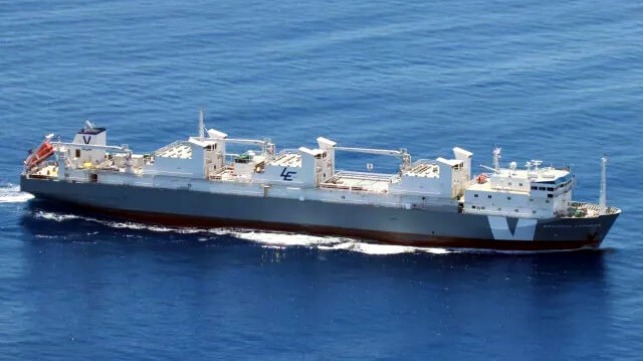END LIVE CARGO SHIPPING
Australia Reports Large Number of Cattle Deaths Aboard Livestock Carrier

Australian authorities are investigating a large number of cattle deaths aboard a live export vessel, the latest incident that yet again puts focus on exports of livestock by sea. Animal rights groups have long called for the end to all live exports and coincidentally today a new report again highlighted the perceived issues in the trade.
By law, exporters must report to Australian authorities when mortality rates exceed half a percent of the shipment or three animals. The Australian Department of Agriculture, Fisheries and Forestry (DAFF) acknowledges it received a voluntary notification of livestock moralities aboard livestock carrier Brahman Express, which is currently on its return voyage to Australia. Unlike many livestock carriers, the vessel which is operated by Vroon, based in the Netherlands, was purpose-built in 2002 versus the older, converted ships. Registered in Luxembourg, the vessel is 5,600 dwt.
Shipping records show the vessel left Darwin on March 15 and was in Indonesia from March 19 to 24. After making a stop in Singapore, it is returning to Darwin where it is expected at the end of the month. The ship appears to regularly run the route between Australia and Indonesia, and although it was not reported how many animals were aboard, the vessel has a capacity of around 4,500 feeder cattle or 2,200 heavier-weight cattle.
“Prior to departure, the department undertook pre-export inspections to ensure that the livestock met requirements under the Export Control Act 2020 and importing-country requirements,” said DAFF in the statement. It added that although there is no suggestion that exotic animal disease is involved, it is investigating the incident as per normal procedures and as a matter of priority.
DAFF did not reveal the number of moralities, although Bloomberg quoted a spokesperson from Australian Livestock Exporters Council (ALEC) confirming that at least 100 animals had perished. ALEC added that the initial assumptions show the deaths could have been caused by Botulism, with the affected animals coming from a single property.
Despite the complaints from animal rights groups, live export remains a large trade. It is estimated that in the European Union, the trade amounts to more than $1.5 billion annually. Australia is Indonesia's biggest supplier of live cattle, shipping around 400,000 animals worth around $400 million to the country annually. In February, Indonesia issued permits to import around 650,000 head of Australian cattle this year.
In April last year, New Zealand banned all exports of livestock by sea owing to the rising cases of mortality and in a move intended to protect the country’s reputation for world-leading animal welfare standards. Australian groups are calling for similar regulations but so far Australia while imposing added restrictions on the trade has not stopped it.
The German animal welfare organization Animal Welfare Foundation together with the French environmental organization Robin des Bois, today published a new report highlighting what they called “serious deficiencies and dangers.”
The groups report that the number of licensed carriers is down from 78 to 64 in the EU over the past three years, but they still call the vessels “substandard” and cite overcrowding and other poor conditions. They report that only four of the vessels licensed by the EU were built for the trade while the others were converted after around 30 years of service. They calculate the average age of the carriers is 43 years and said half the vessels are in higher risk registries, ranked as black flags by the Paris Mou.
The groups said the European Union and Commission must take responsibility. They are again calling for the European Union to increase regulations and end the trade.
No comments:
Post a Comment